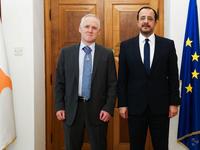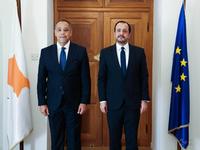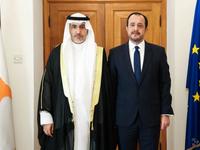Press Releases

20-09-2023 16:30
Address by the President of the Republic, Mr Nikos Christodoulides, at the 78th Session of the UN General Assembly
Wednesday, 20th September 2023
Mr. President,
Your Excellencies,
On the 26th of July 1946, in San Francisco, our predecessors pledged -
“to save succeeding generations from the scourge of war, which twice in our lifetime has brought untold sorrow to mankind”,
“to unite our strength to maintain international peace and security,
[to] settle their international disputes by peaceful means, and refrain … from the threat or use of force against the territorial integrity or political independence of any state.”
These pledges were the promise of our predecessors, bestowed upon us for the future.
The UN Charter, ladies and gentlemen, is a promise, not a reality. If we are complacent in our actions, the words are not worth the paper on which they are written.
The horrors of the Second World War, which began in Europe and consumed the world, brought nations together. We, assembled here today, must live up to the obligations prescribed in the UN Charter, to proclaim -
Never again.
Make no mistake – we bear responsibility to ensure the world does not drift into the horror of war. That is our mandate.
Do we have the courage?
Do we have the resolve to make peace our top priority, to honour the foundations of the United Nations and to ensure its continued relevance?
Our predecessors harboured an admirable sense of their own personal accountability to the future. I believe it is that sense of personal responsibility, from the individual, that underpins the idea and the reality of a United Nations throughout the world.
Our predecessors also knew that the path to peace would be challenging. They had the resolve, the deep belief, the knowledge that it would require the ability of all peoples to come together, to make peace a reality. So that their children, and the generations to come, so that our children today, would not be scarred by another world war.
But they also had the greatest of all impetuses. The world, the leaders that came before us, inherited ashes, not institutions. They had no choice but to look to multilateralism, to international law, respect for the sovereignty and the territorial integrity of all states.
Today, as we stand on the shoulders of our predecessors, we remain accountable to deliver on the vision of peace that sparked the creation of this resilient Organisation. Will we be worthy and equal to the challenge? Can we act with a sense of urgency, without which, we, too, will fail.
Excellencies,
As a historian by training, I believe adamantly that history serves as an invaluable compass, and as the most valuable source of lessons.
More than seven decades following the establishment of the United Nations, the war in Ukraine has shaken the world. It reminds us that “Never again” is a rallying cry, a sacred promise that is fragile, and one that we need to protect with all our resolve.
Cyprus condemns in the strongest terms any breach of international peace and security effected through military action by any state, against the independence, sovereignty and territorial integrity of another state. We stand on this instance of violation of international law, and on every such instance, on the right side of history.
Since the first day of the aggression against Ukraine, the people of Cyprus – a third of them still displaced as a result of foreign aggression against their own country – have displayed solidarity, with deeds, not just words, to the people of Ukraine. We do this because we remember. We do this because it is the right thing to do.
We call for the immediate cessation of hostilities and encourage the parties to engage in constructive dialogue and negotiation. The world must support this effort, not only because history demands it, but also to ensure the world steps back from the edge of a war that could reduce this institution to rubble.
Mr. President,
The invasion of Ukraine is not the first instance that use of force was used against a sovereign nation in Europe following the Second World War.
Just like in Ukraine, in Cyprus the UN Charter and international law continue to be violated.
In 1974 Turkey invaded Cyprus, and since then, 49 years on, it occupies European territory, and its people – Greek Cypriots and Turkish Cypriots – continue to suffer the consequences of invasion, occupation, division. They are deprived of fundamental freedoms and human rights.
Europe, which decades ago witnessed the worst horrors humankind has ever committed against itself, remains fractured as long as Cyprus is divided.
Born in 1973, only a few months before Turkey invaded Cyprus, I have witnessed my people mourn, persevere, rebuild, forever with a burning desire for peace and reunification. The invasion violently displaced hundreds of thousands of Cypriots, and Turkey continues to occupy approximately 37% of the territory of the Republic of Cyprus. The families of missing persons desperately await information on the fate of their loved ones. The enclaved stoically await the end of division.
One of the lessons we are reminded of by the recent invasion of Ukraine is that in the absence of lasting, viable peace, the resulting fragility can lead to destabilization, with far reaching consequences, not just for the country concerned, but for the region to which it belongs, and for the world at large.
Ukraine has exemplified, in the darkest manner, that a threat to peace somewhere is a threat to peace everywhere.
In the absence of a peace path and process in Cyprus, there is a serious risk – and one that we have seen materialize in the recent past - of further violations of international law, which create instability, and with ramifications well beyond Cyprus.
We have witnessed the Turkish military forces perpetrate further violations in Varosha, the fenced area of Famagusta. Since 1974 Varosha has been held hostage and rendered a ghost town, contrary to UN Security Council Resolutions that call for its return to its lawful inhabitants, who left their livelihoods, their dreams and hopes between those fences.
We have witnessed it in our maritime zones, and we have witnessed it most recently in the buffer zone, where attacks on UN peacekeepers by Turkish forces horrified and alerted us once again to the urgency of peace in Cyprus.
That is why the resumption of negotiations, firmly anchored on the agreed framework, is my absolute priority. The current status quo cannot be the future of Cyprus. It cannot be the future for Cypriots.
As President of Cyprus, I believe in peaceful coexistence because, despite growing up in a divided country, I also grew up in a country filled with hope of reunification, with stories of all Cypriots living together in peace, united by the land they shared.
The new generation of Cypriots is also eager for peace. And this gives me hope and courage. Ahead of my journey to New York, I received a plethora of messages from my Turkish Cypriot compatriots, particularly from the younger generation, calling me to exert every effort to reunify Cyprus.
My message from this podium to my Turkish Cypriot compatriots, to all Cypriots, is that I hear their call for peace, I understand their concerns and I assure them that I will spare no effort to make our common dream of reunification and peace on our island a reality. And I want to be able to tell them that the world, the United Nations, the living words of the UN Charter, also hear their call for peace.
I stand before the General Assembly for the first time, fully aware of the responsibility that has been bestowed upon me, to do my utmost to safeguard the future of the Cypriot people – Greek Cypriots and Turkish Cypriots alike – who want to end the division of their country, to co-exist and to co-create.
Working towards peace in Cyprus is my absolute priority, and I want to take this opportunity to also send a personal message to President Erdogan.
There is not, and there will never be another basis for settlement of the Cyprus question other than that dictated by the United Nations Security Council resolutions. Illegality stemming from invasion, aggression and use of force cannot be recognized.
Cyprus and Turkey are neighbours, bound by geography. Peace in Cyprus will not only send a resounding message of peace in a region and a world that desperately needs it. It will also change the geopolitical map of our neighbourhood, with a ripple effect in Europe, the wider Eastern Mediterranean, and throughout EU-Turkey relations. Gunboat diplomacy and strong-arm tactics belong to the past. They are not the tools of visionary leaders. This is our time to bring the UN Charter to life, a Charter for peace between and among us.
No one stands to gain from conflict and division. We, and the generations that will come after us, stand to gain from dialogue, from good neighbourly relations.
Mr. Erdogan, let us work together, guided by a vision of peace. Let us build a brighter future for our countries, through dialogue, and respect of international legality.
Ladies and gentlemen,
In this great hall, we all feel the weight of history on our shoulders. The great women and men who have given us this organization and institutions, expected us to strengthen them, grow them, and to take personal responsibility for their future.
I am here today with clarity of purpose and determination: the sole effective medium to address this risk of instability generated by the absence of a peace path is to pave one, to foster dialogue, through which positions and concerns of all sides can be addressed and discussed in good faith.
I stand ready to negotiate boldly and courageously on the Cyprus question, in good faith, always within the agreed UN framework and in full respect of the relevant UN Security Council Resolutions that call for a bizonal, bicommunal federation with political equality, as defined by the relevant UN Security Council Resolutions. At a time when international legality is under attack, international law, the UN Security Council Resolutions must prevail.
I am committed to negotiating a settlement that will safeguard the fundamental freedoms and human rights, the interests of all my Cypriots compatriots – Greek Cypriots, Turkish Cypriots, Maronites, Armenians and Latins - all equal. A comprehensive settlement that will allow them to prosper in coexistence and peace, free of anachronistic dependencies and system of guarantees that have no place in a European country.
That is why resumption of peace negotiations based on the agreed framework, preserving the acquis of the previous round of negotiations, is essential.
As the Security Council has resolved, it is high time for the UN to become a driving force of dialogue, by appointing, as a first step, an envoy on the Cyprus problem, to explore and prepare the ground for the resumption of negotiations.
The United Nations and its Secretary General have the responsibility, prescribed in the UN Charter, to act as catalysts for peace in Cyprus. In doing so, it can be facilitated by the European Union, which also has the tools necessary and which has expressed its commitment to deliver, so as to reunify its last divided member state. Just like the United Nations, the European Union is also a project of peace. The Union can and must act decisively, with all means at its disposal to drive reunification of its last divided member state, and in doing so contribute to peace in Europe, the wider Middle East, and indeed the world.
Distinguished delegates,
The theme of this year’s General Assembly focuses on the 2030 Agenda and its Sustainable Development Goals (SDGs) towards peace, prosperity, progress and sustainability for all. The achievement of the SDGs requires universal efforts and transformative solutions. Climate emergency and climate change know no borders.
Our own region, the Eastern Mediterranean, is especially vulnerable in this regard. The raging wildfires and floods during this summer are a somber reminder of the fact that we are failing to act, at our own peril. We have all regretfully observed nature’s wrath, from the storm in countries of our region and in countries such as Libya where thousands so tragically lost their lives.
To this end, Cyprus is actively participating in a new international Climate Change Initiative to address the specific needs and challenges countries are facing in our neighborhood to advance mitigation actions. The Climate Ambition Summit taking place today is a critical milestone in confirming our collective political will towards achieving the transition to a climate-resilient global economy.
At the same time, recognizing that human rights are essential for lasting peace and sustainable development, we must ensure that they guide the solutions to our challenges. The international human rights agenda is a priority policy for Cyprus, and it is for this reason, with a particular sense of duty and responsibility, that we announced our candidacy for the Human Rights Council for the period 2025-2027. As an EU member state, we are committed to action against gender-based violence and we have also joined the Secretary-General’s Circle of Leadership on the prevention of and response to sexual exploitation and abuse in the United Nations.
Ladies and gentlemen,
In 1946, Winston Churchill declared that the dangers and difficulties in establishing conditions of freedom and democracy and permanently preventing war will not be removed by closing our eyes to them, nor by a policy of appeasement to aggressors. What is needed is real action and the longer this is delayed, the more difficult it will be and the greater the dangers will become.
Cyprus is at the crossroads of Europe and the Middle East, in a part of the world that is no stranger to conflict and instability. We are, however, convinced that the Eastern Mediterranean and the wider Middle East are changing the narrative of being a region in turmoil. We can become a hub of stability, peace, and cooperation, an exemplar of the change capable in the 21st century. Cyprus seeks to act as a facilitator for this common vision and has come together with its immediate neighbours – Egypt, Israel, Jordan, Lebanon, Palestine, Greece – building a solid network of cooperation that is underpinned by a vision to make the Mediterranean a sea of peace, cooperation and prosperity.
We shall continue on this path of multilateralism anchored on respect for international legality, and we call on all countries of the region that share these values to join us.
This is, after all, the essence of the guiding principles that founded the United Nations 78 years ago.
Peace. I come before you today asking for us all to work together toward peace. It is nothing new, or groundbreaking. But it is world-changing, and we need to remind ourselves, every day, that it is within our reach and responsibility.
Thank you for your attention.
EF/EP/SCH
Relevant Press Releases







